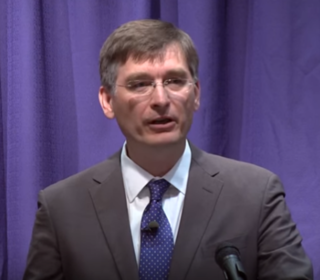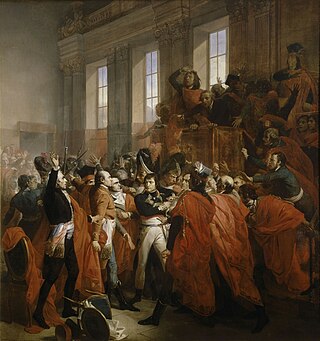
A dictatorship is an autocratic form of government which is characterized by a leader, or a group of leaders, who hold governmental powers with few to no limitations. Politics in a dictatorship are controlled by a dictator, and they are facilitated through an inner circle of elites that includes advisers, generals, and other high-ranking officials. The dictator maintains control by influencing and appeasing the inner circle and repressing any opposition, which may include rival political parties, armed resistance, or disloyal members of the dictator's inner circle. Dictatorships can be formed by a military coup that overthrows the previous government through force or they can be formed by a self-coup in which elected leaders make their rule permanent. Dictatorships are authoritarian or totalitarian and they can be classified as military dictatorships, one-party dictatorships, personalist dictatorships, or absolute monarchies.
A military dictatorship is a type of dictatorship in which power is held by one or more military officers acting on behalf of the military. Military dictatorships are led by either a single military dictator, known as a strongman, or by a council of military officers known as a military junta. They are most often formed by military coups or the empowerment of the military through a popular uprising in times of domestic unrest or instability. The military nominally seeks power to restore order or fight corruption, but the personal motivations of military officers may include greater funding for the military or a decrease in civilian control of the military.

Edward Nicolae Luttwak is an American author known for his works on grand strategy, military strategy, geoeconomics, military history, and international relations. He is best known for being the author of Coup d'État: A Practical Handbook. His book Strategy: The Logic of War and Peace, also published in Chinese, Russian and ten other languages, is widely used at war colleges around the world. His books are currently published in 29 languages besides English.

Robert Anthony Pape Jr. is an American political scientist who studies national and international security affairs, with a focus on air power, American and international political violence, social media propaganda, and terrorism. He is currently a professor of political science at the University of Chicago and founder and director of the Chicago Project on Security and Threats (CPOST).

Andrew Lambert is a British naval historian, who since 2001 has been the Laughton Professor of Naval History in the Department of War Studies, King's College London.

The National Redemption Council (NRC) was the ruling Ghana military government from 13 January 1972 to 9 October 1975. Its chairman was Colonel I. K. Acheampong, who was thus also the head of state of Ghana.

The Supreme Military Council (SMC) was the ruling government of Ghana from 9 October 1975 to 4 June 1979. Its chairman was Colonel I.K. Acheampong. He was also the Head of state of Ghana due to his chairmanship.
Civil resistance is a form of political action that relies on the use of nonviolent resistance by ordinary people to challenge a particular power, force, policy or regime. Civil resistance operates through appeals to the adversary, pressure and coercion: it can involve systematic attempts to undermine or expose the adversary's sources of power. Forms of action have included demonstrations, vigils and petitions; strikes, go-slows, boycotts and emigration movements; and sit-ins, occupations, constructive program, and the creation of parallel institutions of government.
Colonel Kwame R. M. Baah was a soldier and politician. He was the Ghanaian foreign minister between 1972 and 1975.

United States foreign policy in the Middle East has its roots in the 19th-century Barbary Wars that occurred shortly after the 1776 establishment of the United States as an independent sovereign state, but became much more expansive in the aftermath of World War II. With the goal of preventing the Soviet Union from gaining influence in the region during the Cold War, American foreign policy saw the deliverance of extensive support in various forms to anti-communist and anti-Soviet regimes; among the top priorities for the U.S. with regards to this goal was its support for the State of Israel against its Soviet-backed neighbouring Arab countries during the peak of the Arab–Israeli conflict. The U.S. also came to replace the United Kingdom as the main security patron for Saudi Arabia as well as the other Arab states of the Persian Gulf in the 1960s and 1970s in order to ensure, among other goals, a stable flow of oil from the Persian Gulf. As of 2023, the U.S. has diplomatic relations with every country in the Middle East except for Iran, with whom relations were severed after the 1979 Islamic Revolution, and Syria, with whom relations were suspended in 2012 following the outbreak of the Syrian Civil War.

Jakub J. Grygiel is an Ordinary Professor of politics at the Catholic University of America and fellow at The Institute for Human Ecology. He is a senior advisor at The Marathon Initiative and a Visiting National Security Fellow at the Hoover Institution. He is also a book review editor for Orbis. In 2017-2018 he was a senior advisor to the Secretary of State in the Office of Policy Planning working on European affairs. Before joining the Department of State, he was George H. W. Bush Associate Professor at The Paul H. Nitze School of Advanced International Studies. Grygiel was a Senior Fellow at the Center for European Policy Analysis.
Colin S. Gray was a British-American writer on geopolitics and professor of International Relations and Strategic Studies at the University of Reading, where he was the director of the Centre for Strategic Studies. In addition, he was a Senior Associate to the National Institute for Public Policy.
Strategic studies is an interdisciplinary academic field centered on the study of conflict and peace strategies, often devoting special attention to the relationship between military history, international politics, geostrategy, international diplomacy, international economics, and military power. In the scope of the studies are also subjects such as the role of intelligence, diplomacy, and international cooperation for security and defense. The subject is normally taught at the post-graduate academic or professional, usually strategic-political and strategic-military levels.

A coup d'état, also known as a coup, is an illegal and overt attempt by the military or other government elites to unseat the incumbent leader. A self-coup is when a leader, having come to power through legal means, tries to stay in power through illegal means.
Steven R. David is Professor of International Relations at Johns Hopkins University. He specializes in international politics and security issues.
Williamson Murray is an American historian and author. He has authored numerous works on history and strategic studies, and served as an editor on other projects extensively. As of 2012, he is professor emeritus of history at Ohio State University.
Ernest Ako was a Ghanaian police officer and was the Inspector General of Police of the Ghana Police Service from 30 September 1974 to 17 July 1978. He was also Minister of Interior.
Anthony Hugh Selormey is a Ghanaian soldier and politician. He was one of the members of the National Redemption Council (NRC) which overthrew the Progress Party government of Kofi Abrefa Busia on 13 January 1972. He also served briefly in the Supreme Military Council government which followed the NRC.
Lieutenant Colonel Kodzo Barney Agbo is a Ghanaian soldier and politician. He was a member of the National Redemption Council (NRC) which overthrew the government of Kofi Abrefa Busia on 13 January 1972.
Peter Tasiri Azongo is a Ghanaian soldier and politician. He was a member of the Armed Forces Revolutionary Council (AFRC) which ruled Ghana for a few months in 1979.








